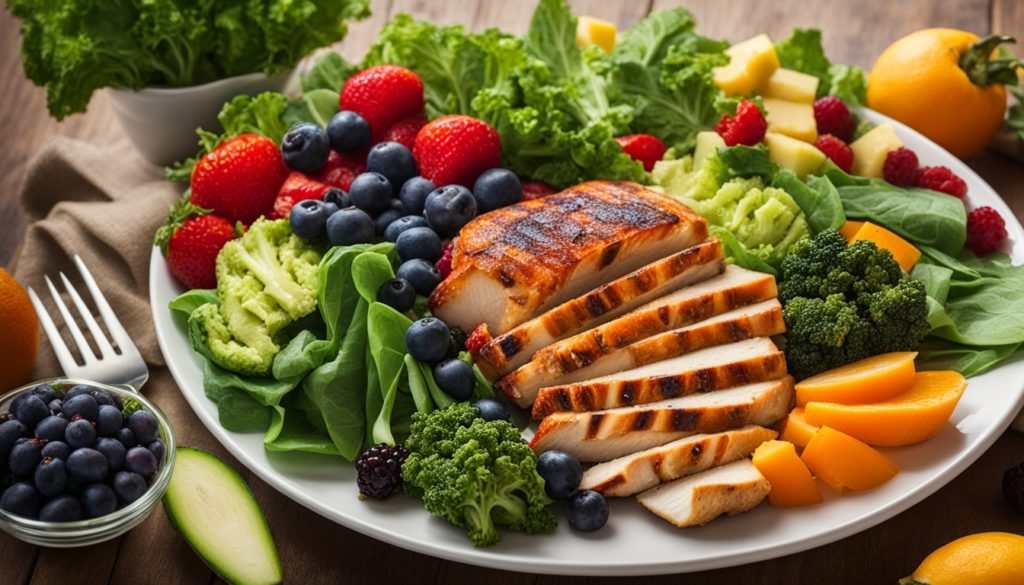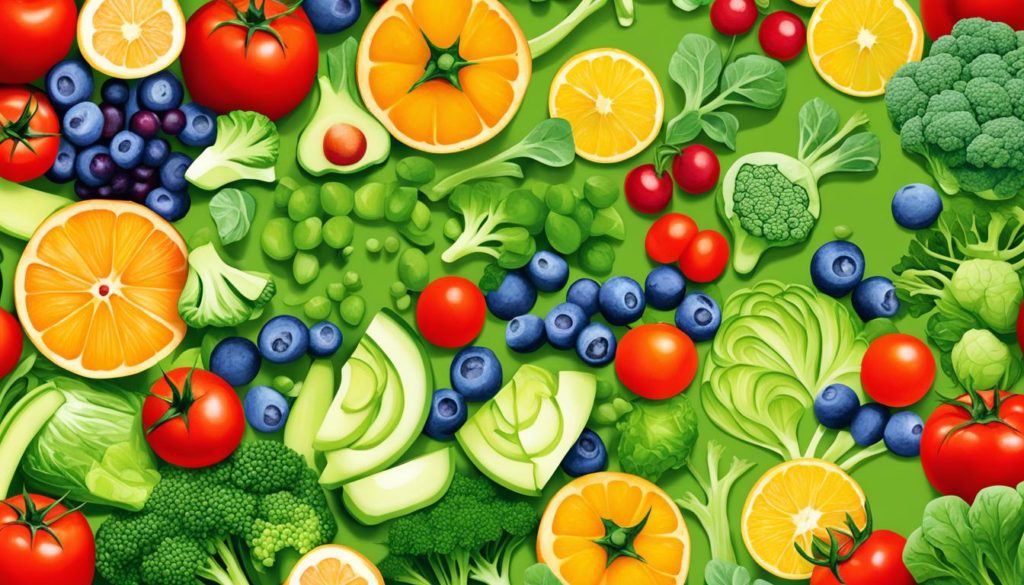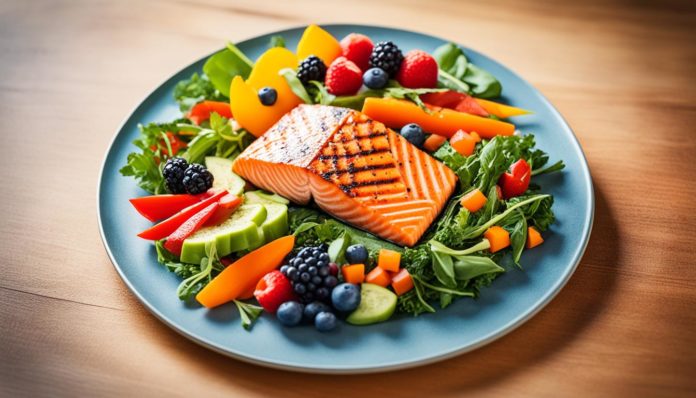Did you know that nearly 1 in 9 men will be diagnosed with prostate cancer during their lifetime, according to the American Cancer Society? A well-planned diet is key to helping men recover from prostate cancer. Eating foods rich in vegetables, low in fatty meats and dairy, and high in plant-based proteins can make a big difference.
It’s important to understand how diet affects prostate cancer recovery and overall health. A diet designed for prostate cancer recovery can help manage the disease and support a healthier lifestyle for patients and their families.
Key Takeaways
- 1 in 9 men are diagnosed with prostate cancer during their life.
- An optimal prostate cancer diet plan focuses on vegetables, low-fat dairy, and plant-based proteins.
- This diet supports not only recovery but overall health and wellbeing.
- Prostate cancer nutrition can significantly impact recovery outcomes.
- A well-planned prostate cancer recovery diet aids long-term health.
- Nutritional support for prostate cancer is critical for patients and their families.
The Importance of a Balanced Diet for Prostate Cancer Recovery
Eating right can lower the risk of heart disease, obesity, and diabetes. It also helps with recovery and boosts the immune system. For prostate cancer patients, following dietary advice is key to staying healthy before, during, and after treatment. Knowing the benefits of healthy eating and what’s good for prostate health can help those recovering.

Why Healthy Eating Matters
Choosing the right diet is crucial for overall health and recovery from prostate cancer. A good diet includes fruits, veggies, lean proteins, and whole grains for all needed nutrients. This diet keeps a healthy weight, which is vital for cancer patients. It also helps manage treatment side effects and makes treatments work better.
Nutritional Benefits for Prostate Health
Prostate cancer diets should focus on antioxidants, vitamins, and minerals. These help reduce inflammation and support the immune system. Foods like tomatoes, berries, and leafy greens are great for prostate health. Also, eating foods with omega-3 fatty acids, such as fish and flaxseeds, can help too. Following these dietary tips can improve health during and after treatment.
Key Nutrients Essential for Prostate Cancer Recovery
Recovering from prostate cancer means eating right is key. A balanced diet is crucial for healing and overall health. Let’s look at the nutrients that help with prostate cancer recovery.
Protein Sources
Protein helps with tissue repair and keeping muscle mass up. Choose lean proteins like skinless poultry, fish, beans, and lentils. Avoid red meat and high-fat dairy to reduce cancer risk. Go for lean meats and plant-based proteins for better prostate health.
Vitamins and Minerals
Vitamins and minerals are important for the body and immune health. Vitamins A, C, and E fight off free radicals. Vitamin D is also key for bone health. Try to get these from whole foods for a better prostate cancer diet.
Antioxidants
Antioxidants protect the body from free radicals that slow down recovery. Eat berries, nuts, and leafy greens for antioxidants. Adding these foods to your diet boosts your antioxidant intake, helping with cancer recovery and prostate health.

Foods to Incorporate into Your Prostate Cancer Diet Plan
Creating a prostate cancer meal plan is key to recovery and health. Adding certain foods to your diet helps fight cancer and lower the chance of it coming back. Here are some important food groups to include for a balanced diet.
Vegetables and Fruits
Vegetables and fruits are crucial for a prostate cancer meal plan. Cooked tomatoes with olive oil are great because of their lycopene. Broccoli, cauliflower, and Brussels sprouts are also good for fighting cancer.
Carrots and sweet potatoes are fruits packed with antioxidants. Eating a variety of colorful, nutrient-rich vegetables and fruits is important for healthy eating for prostate cancer.
Whole Grains
Whole grains are vital for a healthy diet. They give you fiber, vitamins, and minerals. Brown rice, quinoa, and oats help with digestion and lower cancer risk.
Adding these to your prostate cancer meal plan boosts nutrition and supports long-term health.
Plant-Based Proteins
Choosing plant-based proteins is good for cancer recovery. Legumes like lentils, chickpeas, and beans are full of protein and fiber. Soy products, such as tofu and tempeh, add essential amino acids to your meals.
A plant-based diet for cancer recovery helps with healing and keeps you healthy.
Foods to Avoid for Prostate Health
Understanding which foods to avoid is key for a prostate-healthy diet. Avoiding certain foods can greatly improve your health.
Processed Meats
Stay away from processed meats with nitrates and nitrites. These foods are linked to a higher risk of cancer. To fight prostate cancer, avoid foods that can increase cancer risk, like processed meats.
High-Fat Dairy Products
High-fat dairy items, like whole milk, butter, and cheese, are not good for prostate health. They can raise hormone levels that may help cancer grow. It’s better to choose low-fat or non-dairy options to follow diet tips for prostate cancer.
| Food Type | Examples | Reasons to Avoid |
|---|---|---|
| Processed Meats | Bacon, Sausages, Deli Meats | Nitrates and nitrites increase cancer risks |
| High-Fat Dairy Products | Whole Milk, Butter, Cheese | Higher hormone levels linked to cancer progression |
Sample Prostate Cancer Meal Plan
Keeping prostate health in check is key, and eating right can really help. Adding prostate cancer recipes to your daily meal planning for prostate health is a smart move. These meals focus on whole foods that are good for you.
Breakfast Options
Starting your day with a healthy breakfast is important. Here are some great prostate cancer recipes for breakfast:
- Oatmeal with Berries: Oatmeal is great for your heart, and berries add antioxidants. Top it with nuts for extra crunch.
- Spinach and Tomato Omelet: This omelet is full of protein and lycopene, which is good for you.
- Green Smoothie: A mix of spinach, kale, banana, and almond milk makes a smoothie that’s packed with nutrients.
Lunch Ideas
For lunch, choose nutritious meal options for cancer that include plant-based proteins and lots of veggies:
- Quinoa Salad with Veggies: Quinoa, cherry tomatoes, cucumbers, and bell peppers make a tasty salad. Add a light dressing.
- Grilled Chicken Wrap: Use a whole-grain tortilla, lean chicken, greens, and avocado for a healthy wrap.
- Lentil Soup: This soup is filling and full of fiber and protein.
Dinner Suggestions
For dinner, aim for lean proteins and a mix of veggies:
- Baked Salmon with Asparagus: Salmon is full of omega-3s, and asparagus is roasted with olive oil and garlic.
- Vegetable Stir-Fry: Choose tofu or tempeh and add a variety of veggies like bell peppers, broccoli, and snap peas.
- Turkey Meatloaf: A leaner meatloaf option, served with carrots and green beans.
Snacks and Desserts
| Snack | Description |
|---|---|
| Greek Yogurt with Honey | Protein-rich yogurt with a touch of honey and nuts. |
| Apple Slices with Almond Butter | A mix of fiber and healthy fats in a simple snack. |
| Mixed Nuts | Unsalted nuts like almonds, walnuts, or pistachios make a great snack. |
Adding these prostate cancer recipes to your daily meal planning for prostate health can boost your diet. It also supports your recovery. Make sure to mix up your meals and talk to a nutritionist to meet all your dietary needs.
Importance of Maintaining a Healthy Weight
Keeping a healthy weight is key for good health, especially after prostate cancer treatment. Being overweight can affect cancer recovery and long-term health.
How Weight Affects Prostate Cancer Outcomes
Studies show a strong link between obesity and prostate cancer. Being overweight can lead to worse cancer outcomes. People who are overweight or obese might see their cancer get more aggressive and have lower survival rates.
Managing weight can also make life better by lowering the risk of diseases like diabetes and heart disease. These are common in obese people. The healthy weight benefits go beyond cancer recovery, helping with overall health and longevity.
Guidelines for Weight Management
Good weight management for cancer recovery means eating right and staying active. Here are some tips for keeping a healthy weight during and after prostate cancer treatment:
- Balanced Diet: Eat lots of vegetables, fruits, whole grains, and lean proteins. These foods are full of nutrients but low in calories.
- Regular Exercise: Do at least 150 minutes of moderate exercise or 75 minutes of hard exercise each week. Talk to a doctor to make an exercise plan that fits your needs and recovery.
- Monitoring and Support: Keep track of your weight and what you eat to see how you’re doing. Talk to health experts or join support groups to stay on track and get advice.
By following these tips, people can use the healthy weight benefits to help their recovery, reduce risks from obesity and prostate cancer, and get better overall health.
Diet Modifications During Prostate Cancer Treatment
Managing diet during cancer treatment is key for recovery and well-being. Patients often face big changes in their diet due to treatments like surgery, radiation, chemotherapy, and hormone therapy.
Nutritional Side Effects of Treatment
Prostate cancer treatments have different nutritional side effects. Chemotherapy can cause nausea and vomiting, making eating hard. Radiation therapy to the pelvic area can lead to diarrhea or constipation.
Hormone therapy for prostate cancer can cause weight gain and muscle loss. Eating lean proteins, fruits, and vegetables can help. For more diet advice, check out this resource.
Managing Appetite and Weight Changes
Changes in appetite often happen with cancer treatments. Some lose appetite, while others eat more due to stress or medication. Eating small, nutrient-rich meals all day can keep energy up and prevent weight loss.
If you gain weight, eat a balanced diet with whole grains, lean proteins, and lots of fruits and vegetables. A dietitian can help make a meal plan just for you. Getting the right dietary advice can really improve life during treatment.
Managing diet during cancer treatment is crucial. Dealing with changes in appetite or weight requires careful diet planning. This can help with better treatment results and faster recovery.
Top Diet Tips for Prostate Cancer Survivors
Surviving prostate cancer is a big win, but eating right is key for recovery and staying healthy after cancer. Eating certain foods helps with healing and lowers the chance of cancer coming back.
Foods That Promote Healing
For cancer recovery, focus on foods packed with nutrients. These foods give you the vitamins and minerals you need to heal. Add fruits and veggies like berries, leafy greens, and broccoli to your meals. They’re full of antioxidants that fight off harmful free radicals and keep cells healthy.
Lean proteins like chicken, fish, and beans are also crucial. They give you the amino acids you need for fixing tissues and keeping your immune system strong. Choose low-fat dairy for calcium and vitamin D, and skip the processed foods and red meat to help your health after cancer.
Long-Term Dietary Recommendations
For long-term health after cancer, eating a balanced diet is key. Make meals with whole grains like quinoa, brown rice, and whole wheat. These grains are full of fiber, which helps with digestion and keeping a healthy weight. Keeping a healthy weight is important for your overall health and lowering cancer risk.
Drink lots of water to stay hydrated. Herbal teas and fruits and veggies with a lot of water, like cucumbers and watermelon, are great choices. Watch how much you eat and pay attention to your calorie intake to boost your health.
In short, eating foods that help with cancer recovery and being mindful of your eating habits can greatly improve your health after cancer. By choosing the right foods, prostate cancer survivors can stay well and lower the risk of cancer coming back.
Importance of Hydration
Water is key to the body’s healing, especially for prostate cancer patients. It helps carry nutrients and oxygen to cells, keeping the body running smoothly during recovery. It also helps control body temperature, remove toxins, and boost the immune system.
Hydration Tips
Drinking enough water is crucial. Try to drink 8-10 glasses a day and keep track of your fluids. If plain water is boring, add lemon, cucumber, or mint for flavor.
Setting reminders to drink water can help you stay on track, even when you’re busy.
Hydrating Foods and Beverages
Eating and drinking foods high in water can boost your fluid intake. Choose foods like cucumbers, watermelon, strawberries, and spinach. Herbal teas and broths are great too, especially if you have dry mouth from treatment.
Fruit-infused waters and smoothies are tasty and packed with vitamins and minerals. They’re a great way to stay hydrated and healthy.
By focusing on hydration, you help your body heal faster from prostate cancer. Adding hydrating foods and drinks to your diet supports your health and well-being.
FAQ
What is an optimal diet plan for prostate cancer recovery?
The best diet for prostate cancer recovery is full of vegetables and low in fat from red meat and dairy. It should include plant-based proteins. Foods like cooked tomatoes with olive oil, cruciferous vegetables, and fruits high in carotenoids are great for fighting cancer.
Why is a balanced diet important for prostate cancer recovery?
Eating a balanced diet lowers the risk of heart disease, obesity, and diabetes. It helps the immune system recover. It’s key to keep a healthy weight and eat foods full of nutrients before, during, and after treatment.
What are the key nutrients essential for prostate cancer recovery?
Important nutrients for recovery include proteins, vitamins, and antioxidants. These should come from whole foods, not supplements, except for vitamin D. Good sources are lean meats, plant proteins, vegetables, and fruits.
What foods should be incorporated into a Prostate Cancer Diet Plan?
Add vegetables, fruits, whole grains, and plant-based proteins to your diet. These foods help with recovery and prevent cancer from coming back.
What foods should be avoided for prostate health?
Stay away from processed meats with nitrates, charred meats, and high-fat dairy. These foods increase the risk of advanced prostate cancer. Eating less of these can lower cancer progression risk.
Can you suggest a sample meal plan for prostate cancer patients?
Here’s a meal plan: start with oatmeal and berries for breakfast. Lunch could be lentil soup with plant-based proteins. Dinner might be grilled chicken with steamed broccoli. Snacks can be nuts and fruit slices for antioxidants.
How does maintaining a healthy weight affect prostate cancer outcomes?
Keeping a healthy weight is crucial as being overweight worsens cancer outcomes. A balanced diet and exercise help maintain a healthy weight. This improves survival rates and lowers cancer return risk.
What diet modifications should be made during prostate cancer treatment?
During treatments like surgery or radiation, eating well can be tough due to loss of appetite and weight changes. It’s important to eat enough nutrients and stay hydrated with a balanced diet.
What dietary strategies should prostate cancer survivors follow long-term?
Survivors should focus on eating plant-based foods, lean proteins, and low-fat dairy. Avoid processed foods and red meats. This diet reduces recurrence risk and supports a healthier life.
Why is hydration important during prostate cancer recovery?
Staying hydrated is key for recovery and overall health. To stay hydrated, drink plenty of water and eat hydrating foods like fruits, vegetables, and herbal teas.


